|
|
|
Sort Order |
|
|
|
Items / Page
|
|
|
|
|
|
|
| Srl | Item |
| 1 |
ID:
118003
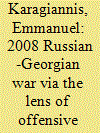

|
|
|
|
|
| Publication |
2013.
|
| Summary/Abstract |
The Russian intervention in Georgia's breakaway republic of South Ossetia in August 2008, Moscow's first-ever use of military force against a sovereign state in the post-cold war period, deserves a theoretical explanation. By following the tenets of Offensive Realism, this article will argue that the US-Russian competition in the South Caucasus is the main cause of the 2008 Russian-Georgian war. During the 1990s, the USA passed the buck to Turkey to contain Russian influence in the South Caucasus. In the early to mid-2000s, however, the Russian-Turkish relations were improved so rapidly that the USA opted, through NATO expansion, to step in as an offshore balancer. Following Bush administration's decision to support the Georgian candidacy for NATO membership and Georgia's ill-fated attempt to seize South Ossetia, Moscow went to war to re-establish hegemony in the South Caucasus. In this way, as the theory of Offensive Realism claims, the Kremlin believes that Russian state will enhance its chances of survival in the anarchical international system.
|
|
|
|
|
|
|
|
|
|
|
|
|
|
|
|
| 2 |
ID:
116312
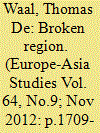

|
|
|
|
|
| Publication |
2012.
|
| Summary/Abstract |
This essay reviews failed historical attempts at regional integration in the South Caucasus since the early twentieth century, and in particular the failed Transcaucasian federations of 1918 and 1922-1936 and the breakdown of Soviet economic integration in the region. It argues that there is much that makes the South Caucasus a viable region in terms of geography, culture and economic potential, but political contradictions and persistent perceptions of insecurity make for a pattern of recurring fragmentation. Both Caucasians and outsiders have a role to play if voluntary integration is to work as a project in the future.
|
|
|
|
|
|
|
|
|
|
|
|
|
|
|
|
| 3 |
ID:
188135
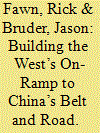

|
|
|
|
|
| Summary/Abstract |
China’s Belt and Road Initiative (BRI) is already changing infrastructure and production across much of the world. The three states of the South Caucasus and their counterparts in Central Asia need diverse connectivity to preserve their economic and political independence amid China’s expanding influence. Despite some rhetoric and practical measures, the United States and the European Union (EU) continue to underestimate the BRI. This article identifies recent international and regional developments that converge to create a unique opportunity for the West and South Caucasus partners. They may develop integrated, long-terms infrastructure of lasting mutual benefit. The convergence of events in and around the South Caucasus offers the place for the West to build an “On-Ramp” to the BRI. The South Caucasus provide a potential gateway into Asia’s heart that is not dictated solely by the priorities of Chinese foreign or commercial policies, just as the Baku-Tbilisi-Ceyhan pipeline of a generation ago served a similar role.
|
|
|
|
|
|
|
|
|
|
|
|
|
|
|
|
| 4 |
ID:
112967
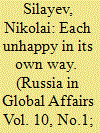

|
|
|
|
|
| Publication |
2012.
|
| Summary/Abstract |
After gaining independence, Georgia, Armenia, and Azerbaijan have been plagued by wars and ethnic conflicts, they have lost transport links, and government agencies have collapsed. Yet the respective political regimes have had diverse fates: although the starting points and international situation were similar when they launched their policies, the outcome is fairly different.
|
|
|
|
|
|
|
|
|
|
|
|
|
|
|
|
| 5 |
ID:
100927
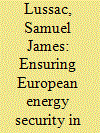

|
|
|
|
|
| Publication |
2010.
|
| Summary/Abstract |
Why has the European Union been so little involved in South Caucasian pipeline politics in the last two decades? Deconstructing the European Union (EU) around the Caspian hydrocarbons transportation network, this article tries to demonstrate how European beliefs toward Russia prevented further EU involvement in the South Caucasus. Until the 2006 Russian-Ukrainian gas crisis, most of the European actors gave more importance to the EU-Russian partnership than to the relations with the South Caucasian states. But the rising concerns over Russia as a reliable energy partner have led to a reconfiguration of the European exchanges with the South Caucasus. Since 2006, the energy cooperation between the EU and Azerbaijan and Georgia has considerably increased, to such an extent that the former is about to become a central component of the Caspian hydrocarbons transportation network. Despite the division among member states and inside the European Commission, this increasing cooperation is especially vivid regarding the implementation of the Southern Gas Corridor. The decrease of confidence between Russia and the EU has thus paved the way for further involvement in pipeline politics in the South Caucasus, leading to a new definition of European energy security in Russian 'Near Abroad'.
|
|
|
|
|
|
|
|
|
|
|
|
|
|
|
|
| 6 |
ID:
142629
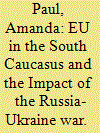

|
|
|
|
|
| Summary/Abstract |
Despite hopes that it would act as a transformative tool in the South Caucasus to strengthen democracy, stability, security and regional cooperation, the Eastern Partnership (EaP) has produced limited results, with the region more fragmented today than it was five years ago. Russia’s war against Ukraine has further exacerbated the situation, raising concerns over the extent to which South Caucasus countries can genuinely rely on the West. Today, Georgia, Armenia and Azerbaijan have different geostrategic trajectories. While Georgia has stuck to the Euro-Atlantic track, Armenia joined the Russian-led Eurasian Union in January 2015. Meanwhile Azerbaijan has the luxury of choosing not to choose. Developments in the region have demonstrated that a ‘one size fits all’ approach does not work and a more differentiated policy is required.
|
|
|
|
|
|
|
|
|
|
|
|
|
|
|
|
| 7 |
ID:
112968
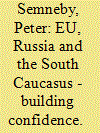

|
|
|
|
|
| Publication |
2012.
|
| Summary/Abstract |
Closed borders between Armenia and Azerbaijan, Armenia and Turkey, as well as the absence of functional relations between Russian and Georgia, severely hamper the full potential of the region.
|
|
|
|
|
|
|
|
|
|
|
|
|
|
|
|
| 8 |
ID:
178180
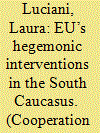

|
|
|
|
|
| Summary/Abstract |
This article draws upon poststructuralist and postcolonial theories to examine the European Union’s (EU’s) policies of human rights promotion in the South Caucasus – notably, the EU’s engagement with local human rights activists and organisations in Armenia, Azerbaijan and Georgia. Contrary to most literature, which has been concerned with policy (in)effectiveness, this article is interested in problematising the discursive foundations of this EU-civil society ‘partnership’ in the realm of human rights promotion, as well as in retrieving the agency of actors who are ‘at the receiving end’ of EU policies. It is argued that the discursive construction of ‘civil’ society as a ‘good-Other’ of the EU-Self serves as a means to depoliticise the EU’s interventions, aiming at the approximation of ‘transitioning’ countries to the EU’s human rights standards. Although the hegemonic relation requires subaltern actors to perform the ‘civil’ society identity, processes of hybridisation and subversion arise as external interventions interact with local realities and meanings. Building on in-depth interviews and ethnographic observations, the article shows how the hegemonic identity of ‘civil’ society is negotiated by South Caucasus ‘not-quite-civil’ actors striving for local legitimacy, financial survival or ownership of their human rights work.
|
|
|
|
|
|
|
|
|
|
|
|
|
|
|
|
| 9 |
ID:
019604
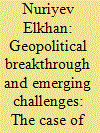

|
|
|
|
|
| Publication |
June-Aug 2001.
|
| Description |
138-157
|
|
|
|
|
|
|
|
|
|
|
|
|
|
|
|
| 10 |
ID:
053635
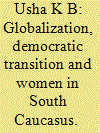

|
|
|
| 11 |
ID:
113776
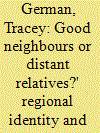

|
|
|
|
|
| Publication |
2012.
|
| Summary/Abstract |
Conceptualization of the South Caucasus as a distinct regional unit is a relatively new development. Notwithstanding geographic proximity, the three states of the region face different political, economic and security realities, precipitating different strategic orientations. Conflicting dynamics complicate relations between states and serve to undermine efforts, both internal and external, to establish a sense of regional identity and advance inter-state cooperation. This paper argues that the concept of a distinct 'South Caucasus' region is an externally generated, geographical label, which implies a certain degree of unity and positive interdependence that does not exist. The three states may be geographical neighbours, but they are not 'good neighbours', as the complex web of enmities that has developed over the centuries means the three states tend to look externally to 'distant relatives', undermining both regional cohesion and awareness.
|
|
|
|
|
|
|
|
|
|
|
|
|
|
|
|
| 12 |
ID:
157566


|
|
|
| 13 |
ID:
086342
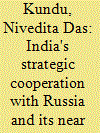

|
|
|
|
|
| Publication |
2008.
|
| Summary/Abstract |
The emergence of fifteen independent states as a result of the collapse of the Soviet Union in 1991, has offered new challenges and opportunities for India to broaden its bilateral and multilateral relationships with Russia and it's near abroad states.
|
|
|
|
|
|
|
|
|
|
|
|
|
|
|
|
| 14 |
ID:
139221
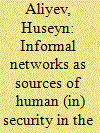

|
|
|
|
|
| Summary/Abstract |
In contrast to numerous studies on exogenous mechanisms of human security – such as the provision of human security by international actors – this study examines the role of informal networks in providing ‘freedoms from want’ and ‘freedoms from fear’ to the population. With the primary focus on post-communist South Caucasus (Armenia, Azerbaijan and Georgia) this article conducts a rigorous examination of informal networks’ critical function as sources of human (in)security since the breakup of the Soviet Union. Based on a combination of open-ended elite (expert) interviews, field observation and closed-ended survey data, this study demonstrates that apart from the informal networks’ crucial role in generating social capital and functioning as indispensable social safety nets, they also exacerbate human insecurity by cementing the traditions of clientelism and corruption that are deeply entrenched in the region.
|
|
|
|
|
|
|
|
|
|
|
|
|
|
|
|
| 15 |
ID:
077505
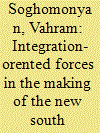

|
|
|
| 16 |
ID:
095926
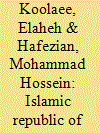

|
|
|
|
|
| Publication |
2010.
|
| Summary/Abstract |
Deep geopolitical changes in the South Caucasus have considerably influenced the relationships of Iran and the three republics of Armenia, Azerbaijan and Georgia. Geographical location and strategic significance have made this region one of the most important in the world. Because of its historical affinities and socio-cultural links with the region's peoples, the Islamic Republic of Iran has expanded political-economic cooperation with them. The active presence of regional and trans-regional actors has directly affected this relation. This article mainly seeks to examine Iran's relations with the South Caucasus republics, considering the opportunities created since their independence following the collapse of the Soviet Union.
|
|
|
|
|
|
|
|
|
|
|
|
|
|
|
|
| 17 |
ID:
152937
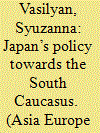

|
|
|
|
|
| Summary/Abstract |
The article investigates Japan’s foreign policy towards the South Caucasus by unveiling the full range of its paraphernalia. After dwelling on Japan as a foreign policy actor, it delineates the policy vis-à-vis the South Caucasian states of Armenia, Azerbaijan and Georgia along the categories of political dialogue, development assistance and economic cooperation by relying on untapped primary sources. Subsequently, the article analyzes the official discourse pertaining to Japan’s strategy and tactics with respect to the South Caucasus. Ultimately, it provides an explanation by situating the case study within the existing conceptual frameworks of “civilian” and “normative power”. Based on the findings, the article argues that Japan has not been a “normative” but it has been a “civilian power”—a conceptual framework, which can be placed within the theory of neo-liberalism. In a nutshell, even though Japan is an enigmatic actor, it has been predominantly pragmatic in its policy towards the South Caucasus.
|
|
|
|
|
|
|
|
|
|
|
|
|
|
|
|
| 18 |
ID:
158389


|
|
|
|
|
| Summary/Abstract |
While espoused by the newly independent states after the collapse of the Soviet Union, the liberal order has not taken root in interstate relations and is now openly contested in Eastern Europe and the South Caucasus. However, the challenges presented (primarily by Russia) to the international order also trigger growing contestation, in several Eastern European and South Caucasus countries, of an existing regional order premised on Russian hegemony. Therefore, the picture that emerges from these multiple contestations is not an alternative regional order, but rather overlapping orders in a fragmented region.
|
|
|
|
|
|
|
|
|
|
|
|
|
|
|
|
| 19 |
ID:
181639
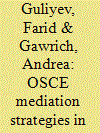

|
|
|
|
|
| Summary/Abstract |
Even though the Organization for Security and Cooperation in Europe (OSCE) has performed mediation efforts in Eurasian secessionist conflicts, its role has been neglected by mainstream international relations (IR) and conflict mediation literature. To fill in this gap, this article examines OSCE mediation strategies in two major secessionist conflicts: the Nagorno-Karabakh (NK) conflict between Armenia and Azerbaijan and the conflict in Eastern Ukraine. Drawing on Zartman’s conceptual framework, this study posits that OSCE mediation strategies were constrained given its weak organisational capacity, lack of legal empowerment and adverse geopolitical environment. Due to these structural limitations, the OSCE can be said to have been more effective in containing conflict than contributing to conflict resolution. This article aims to contribute to conflict mediation research by highlighting the importance of context for understanding the role of international organisations (IOs) as mediators.
|
|
|
|
|
|
|
|
|
|
|
|
|
|
|
|
| 20 |
ID:
088728
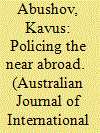

|
|
|
|
|
| Publication |
2009.
|
| Summary/Abstract |
This article tries to understand Russia's policies towards the South Caucasus and answer the question of whether there is a tension between Russia's interests and policies. An attempt is made to identify Russia's strategic interests in the region and the crucial factors that shape Russian policies. Based on the assumption that today's Russia gives de facto support to the secessionist regimes in Georgia, the author attempts to explain what the Kremlin's motives are in supporting the secessionist regimes. The author investigates whether Russian support for the separatist regimes in the South Caucasus is a reaction to the foreign policy orientation of the parent states or a part of Russia's security political interests. On the one hand, supporting instability in the South Caucasus cannot be a part of the Kremlin's strategic interests, because that can pose a threat to the North Caucasus. On the other hand, however, Russian policies are not designed to achieve long-term stability in the South Caucasus, and controlled instability seems to suit the Kremlin. Why Russia vies for coercive hegemony and supports secessionism are the central questions of this article.
|
|
|
|
|
|
|
|
|
|
|
|
|
|
|
|
|
|
|
|
|